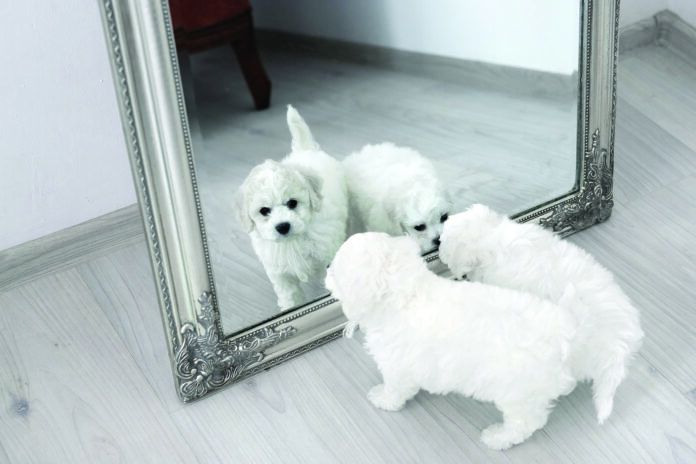If you put some tape on the forehead of a chimpanzee or a dab of cream on his nose, he will see those things on himself in the mirror and work to take them off. Dolphins also appear to have passed what is called the “mirror mark test,” at least to some degree. Not so, dogs. In fact, if you’ve noticed your dog surveying himself in the mirror, chances are he doesn’t recognize it’s him. If he starts barking or moving forward and backwards from his image, he may very well think he’s reacting to another dog. But that doesn’t mean that the self does not reflect back to a dog.
It’s just that his awareness of himself appears to come with the use of his nose rather than his eyes. Scientists have conducted experiments in which they observed how dogs react to the scent of urine and have seen that while they find the odor of other animals’ urine quite interesting, they could generally take or leave their own. It doesn’t line up exactly with a mirror mark test, but dogs do seem to experience some kind of olfactory reflection. “Oh yeah, that one’s me. No new information to check out there.”
Where human and canine self-awareness cross paths
For people, there’s knowledge of yourself in space and your impact on your immediate environment. Dogs have it, too. Researchers at Eötvös Loránd University in Budapest made the point when they had 32 dogs of various breeds and sizes sit on a mat. In one scenario the mat had a toy attached. In another, the toy was placed to the side of the mat. In both instances, the dogs were asked to give the toy to their human family member as part of a game. But when they tried to take it from the mat, they could feel the tug under them as they pulled and understood themselves to be the hindrance—at which point they got off the mat to successfully retrieve the toy and hand it over.
Dogs also share with people something called episodic memory. If you repeat an experience and remember that you have already had that experience and know what it felt like, the memory of it increases your self-awareness. Reactions can range from “I like that” to “I want to avoid that” to “That’s boring, but not harmful.”
Dogs very much seem to share our capacity for episodic memory, at least to some degree. And you don’t need a scientific experiment to prove it. Think about how it could seem to your dog when you’re driving and it looks like you’re taking him to the vet’s office. All of a sudden you might notice a significant uptick in alertness, and maybe even panic. But then you take a turn onto a different route and your pet’s mood quickly switches from quite anxious to simply concerned — and curious.
Granted, that’s not the same as a physical recognition of self, but it does mean your dog can recall past experiences and what they mean to him. That psychological understanding of the self also plays into how he learns tricks. “I don’t know why it’s important to her that I go sit when she asks me to, but when I do, I get a treat, and that
feels good.”





